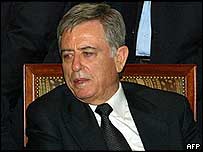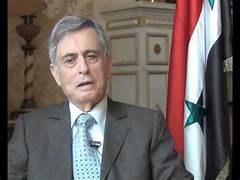Exiled former Syrian Vice President Abdul Halim Khaddam tells SPIEGEL about his firsthand experience with President Bashar Assad’s hunger for power and forecasts the end of his regime as the brutal suppression of the Syrian opposition continues.
SPIEGEL: President Bashar Assad is attacking his own people with tanks. Is this the beginning of the end for his regime?
Khaddam: The president is politically dead. Although he is grimly determined to stay in power, the Syrians have already made a fundamental decision: They want to overthrow this regime.
SPIEGEL: When will Assad give up?
Khaddam: Perhaps in as little as a few weeks. The Syrians have suffered under the dictator for four decades. A boundless fury has been building up, and now it can no longer be contained.
SPIEGEL: The regime claims that the protesters are armed and have shot soldiers.
Khaddam: That’s a lie. But there are destructive forces from abroad, countries that are meddling.
SPIEGEL: To whom are you referring?
Khaddam: I’m referring to Iran. Anyone who believes that political decisions in Damascus are made without Iran these days is mistaken. Bashar and his brother Maher …
SPIEGEL: … who commands the Presidential Guard …
Khaddam: … have become vicarious agents of the Iranian Revolutionary Guard. Many Syrian intelligence officers were trained in Iran. There has been close military and security-policy cooperation between our countries for years. But Iran’s cultural influence is also growing. Branches of Iranian foundations are active in Syria, and Iranian pilgrims are coming to the Umajjaden Mosque in Damascus on certain occasions and are daring to flagellate themselves, a bloody ritual that rarely happened in Syria in the past.
SPIEGEL: You were a member of the Assad regimes for decades.
Khaddam: I distanced myself from Bashar years ago. Syrians know that. And the fact that I was taken in by his father Hafez is one the greatest regrets of my life.
SPIEGEL: You were a member of the regime when the Syrian army mowed down more than 20,000 civilians during the Hama massacre in 1982. What role did you play?
Khaddam: The responsibility for the Hama massacre lies with Hafez’s brother, Rifaat al-Assad …
SPIEGEL: … who lives in exile in London.
Khaddam: I and other leading members of the Baath Party didn’t find out what had really happened until later.
SPIEGEL: Hama is one of the darkest chapters in the history of Syria. Could such a massacre happen again?
Khaddam: What is happening now in Daraa is moving in the same direction. Civilians are also being murdered there. But today we have the Internet, and today the entire world finds out about these things within a very short time.
SPIEGEL: As someone who knows the family, did you see Bashar Assad as a great hope for the country?
Khaddam: He promised reforms, and he wanted to open up the country. I believed him, as did many other Syrians. But in fact Bashar did nothing but postpone his promises. He wanted to become like his father. But the differences between the two couldn’t be more striking. Hafez was a true political pro, a strategist who always knew when he had to make a momentous decision. By contrast, Bashar is volatile, unstable and prepared to change his mind at any time. A man without charisma, without vision.
SPIEGEL: How powerful are the Assads?
Khaddam: Extremely powerful. We are really talking about less than 20 people who are dividing up Syria’s riches. This applies to a dozen members of the Assad family and their relatives, the Makhlouf clan. Rami Makhlouf, for example…
SPIEGEL: … Bashar’s rich cousin …
Khaddam: … controls a network of companies that makes up a substantial portion of the Syrian gross domestic product.
SPIEGEL: It has been repeatedly claimed that Assad is merely a figurehead, and that others hold the reins — like the head of the powerful intelligence services, for example.
Khaddam: No, Bashar is clearly the ruler. Immediately after taking office, he placed people of his choice — from the Presidential Guard, in particular — in key positions. For example, the head of military intelligence comes from the Presidential Guard.
SPIEGEL: Assad has more power than Egyptian President Hosni Mubarak had?
Khaddam: Indeed. Mubarak controlled politics and dominated the economy, but there were clear boundaries when it came to the armed forces. This also explains why the Egyptian military — and the Tunisian military, for that matter — protected the revolutionaries. In Syria, on the other hand, the army is willing to shoot at fellow Syrians. Why? Because the senior officers are hand-picked.
SPIEGEL: Does the Baath Party, of which you were a member for several decades, still have a future?
Khaddam: Today’s Baath Party no longer has anything in common with the Baath Party at the time of its establishment. The regime has not retained any of the party’s key principles, like the sanctity of the individual and a democracy based on free elections.
SPIEGEL: The Muslim Brotherhood, which was part of the opposition to the Assad regime from the beginning, will also have a voice in a new Syria. What role will the Islamists assume?
Khaddam: Our revolution is a nationwide uprising and not a revolt by a specific region or ethnic group. We all have one goal: To liberate Syria from this regime.
SPIEGEL: Does that include the Muslim Brotherhood?
Khaddam: Of course, as long as they abide by democratic rules.
SPIEGEL: The West fears that religious extremists could come into power.
Khaddam: Tell me about a single case in which extremists conducted campaigns in Syria!
SPIEGEL: Are you denying that there are Islamists prepared to use violence in Syria?
Khaddam: No, they do exist. But the regime established these groups, and then their members were sent abroad, to Iraq, for example. Some also went to Lebanon, to the Nahr al-Barid Palestinian camp, for example, to sow the seeds of chaos.
SPIEGEL: Is the Assad regime inciting unrest in Lebanon?
Khaddam: Syria has been the link between Iran and Lebanon since 1979. Tehran sees Syria as its de facto strategic base, allowing it to expand its influence in the Arab world. Iran also took over the Palestinian organizations Hamas and Al-Jihad al-Islami with Syrian help. Iran jeopardizes our revolution.
SPIEGEL: What happens if the regime in Damascus collapses?
Khaddam: Bashar’s overthrow will have a positive impact on all neighboring countries. A new democratic system will maintain close relations with revolutionary Egypt, and the Syrian-Egyptian alliance will rise again. The result is that Iran’s strategic ambitions will be limited to within its borders in the future.
SPIEGEL: And what happens to Israel if the Assad regime falls?
Khaddam: Every future government will abide by the Arab peace plan, to which the Arab League gave its blessing. That plan also calls for the return of the Israeli-occupied Golan Heights.
SPIEGEL: But the Muslim Brotherhood doesn’t want to recognize Israel.
Khaddam: Public opinion in Syria demands that we coordinate our policy with all partners. Naturally, if the Arab nations agree to a peace with Israel, Syria will participate.
SPIEGEL: How can Europe help?
Khaddam: With measures that strangle the regime. It should adopt sanctions and freeze the accounts of the Assad clique.
SPIEGEL: Should the West also intervene militarily?
Khaddam: Looking on as the Syrian people are massacred is unacceptable. If necessary, all means must be employed to put an end to the atrocities. That includes military means.
Interview conducted by Daniel Steinvorth and Volkhard Windfuhr



